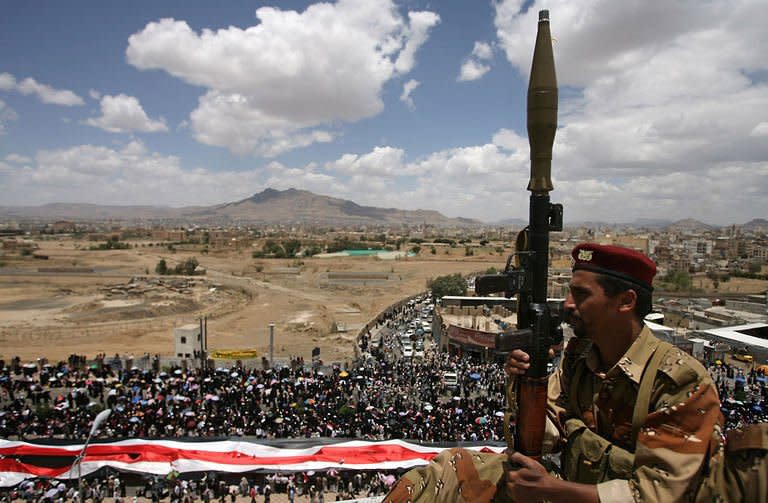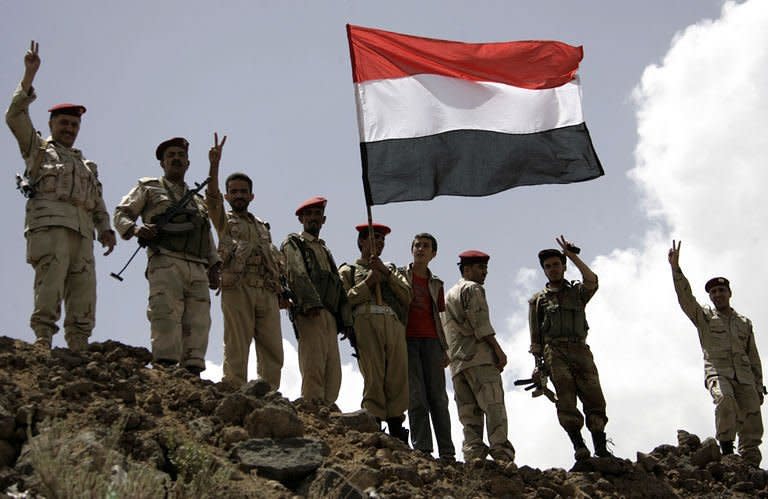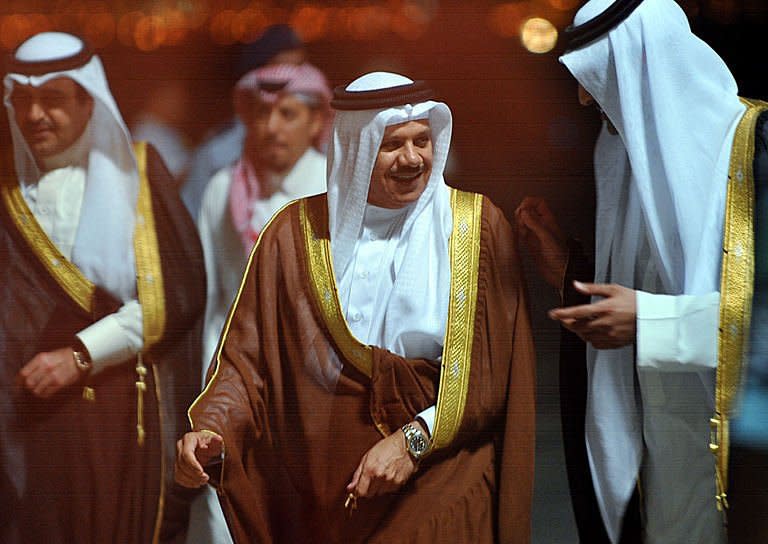Yemen transition plan falters, Saleh refuses to sign
A Gulf mediator flew out on Sunday after failing to secure Yemeni President Ali Abdullah Saleh's signature on a transition deal for him to quit office, although his ruling party signed the accord. Saleh set a new condition to ratify the plan proposed by the Gulf Cooperation Council (GCC) to end four months of deadly anti-Saleh protests, demanding that representatives of the opposition sign the deal in his palace. As a result, ministers from the GCC meeting in Riyadh announced they had suspended mediation efforts in Yemen. State television aired footage of Saleh standing next to the Gulf mediator, GCC secretary general Abdullatif al-Zayani, as members of the ruling General People's Congress (GPC) signed the deal, a day after the opposition signed. "The opposition will be (according to the plan) a partner in the transitional government for 90 days, so are we going to deal over the phone? Why don't they come?" Saleh asked. As a result, Zayani left Sanaa without Saleh's signature for Riyadh, where he joined a meeting of GCC foreign ministers on Yemen at which its oil-rich neighbours said they had suspended their mediation. The GCC had "decided to suspend their initiative in the absence of the propitious conditions," said a statement issued from Riyadh. In their statement, the ministers expressed the hope that Saleh would soon sign up to the deal, which they described as "the best way possible to overcome the current situation." Since late January, security forces have mounted a bloody crackdown on protests demanding Saleh's departure, leaving at least 181 people dead, according to a toll compiled from reports by activists and medics. The statement from the GCC monarchies also expressed "their deep concern" at the way the situation was developing in Yemen, and called on its people to show "patience and wisdom" to avoid a national catastrophe. Zayani and Western envoys were earlier encircled at the Emirati embassy by armed regime supporters, in a new twist that appeared to aim to stop the mediator from reaching Saleh's palace for a signing of the deal. But he was lifted along with the US ambassador Gerald Michael Feierstein to the presidential palace in two Yemeni helicopters, a United Arab Emirates embassy official told AFP. The GCC statement expressed regret at the incident. One chopper later carried Zayani to the airport and the other returned Feierstein to the UAE embassy to rejoin the ambassadors of Britain, the EU and the UAE, the official added. UAE Foreign Minister Abdullah bin Zayed Al-Nahayan telephoned his Yemeni counterpart Abu Bakr al-Kurbi to call for "swift measures to secure" the embassy and its occupants, the Gulf state's WAM state news agency said. Saleh also warned of civil war if the opposition refused to sign the GCC deal in his presence. "If they remain stubborn, we will confront them everywhere with all possible means," he said. "If they don't bow, and want to take the country into a civil war, let them be responsible for it and for the blood that was shed and that will be shed if they insist on their stupidity," Saleh added. Earlier in the day, GPC deputy chief Sultan al-Barakani said "the president refuses to sign until an agreement is reached on mechanisms to implement" the Gulf-brokered accord. Under the terms of the Gulf initiative, Saleh would hand power to the vice president 30 days after the signing, and he and his aides would be granted immunity from prosecution by parliament. A national unity government led by a prime minister from the opposition would be formed, and a presidential election would follow 60 days after Saleh's departure. Saleh's ruling party said he does not recognise the opposition's signing of the plan, even after US Secretary of State Hillary Clinton said the president "needs to follow through on his commitment" to cede power. The opposition, meanwhile, urged the United States and Saudi Arabia to pressure Saleh to sign the exit plan and vowed it would press on with protests. "Only the United States and Saudi Arabia are able to pressure him," Mohammed al-Qahtan, spokesman for the Common Forum umbrella group of opposition parties in parliament, told AFP. "If they make it clear to him that he will be held responsible for the failure of the mediation efforts, he will sign," he said. But, "if Saleh does not sign, the revolt will escalate and he will be thrown out of office." Opposition sources said on Saturday that they had signed the accord for Saleh to cede power, but Qahtan said: "We will not take part in any signing at the presidential palace." Meanwhile, medics said gunmen shot dead an anti-regime protester on Sunday in the capital, as members of the opposition said the protester was killed by pro-regime "thugs." Hundreds of the veteran leader's loyalists armed with batons blocked roads in Sanaa leading to the presidential palace, to the airport and Tahrir Square near government headquarters, said an AFP correspondent. Hundreds of thousands of Saleh opponents also took to Sanaa streets, in their biggest rally since protests began in January. Doctors marched in their white coats, while young protesters wore the red, black and white of the Yemeni flag. Meanwhile, Republican Guards soldiers, who are led by Saleh's son Ahmed, opened fire on demonstrators and wounded seven in the city of Taez, south of Sanaa, where hundreds of thousands called for Saleh's ouster, witnesses said. Similar protests erupted across the strategic Arabian Peninsula country in Al-Hudaydah, Ibb, Al-Baida, Marib, Aden and Hadramawt, according to local residents.





